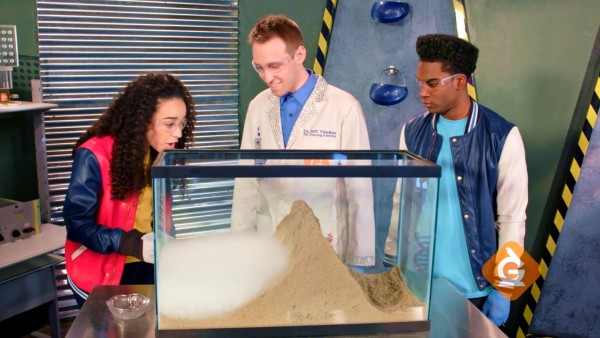Generation Genius presents some of the most exciting, professionally-produced, video-based science lessons you can find. These lessons were created in partnership with the National Science Teachers Association and align with Next Generation Science Standards. As of October 2021, there were 117 videos targeting three different ages groups: K-2, 3-5, and 6-8—more than 35 for each age group.
Each of the twelve-minute video lessons features the highly entertaining Dr. Jeff Vinokur—think of a young Bill Nye the Science Guy. These high-energy videos often incorporate lab demonstrations with explosions, fire, dancing, a robot, and much more fun and craziness that kids will enjoy. In addition, Dr. Jeff and his companions Izzy and Zoe frequently take field trips to investigate topics—trips such as to the La Brea Tar Pits to learn about fossils, to Busch Gardens in Florida to check out animal adaptations, or to a gym to test out the properties of bodies in motion (physics).
Videos range across the various science disciplines, covering topics such as adaptions and the environment, earth’s orbit and rotation, food webs, the water cycle, weather versus climate, the conservation of matter, and human body systems.
On the webpage for each video are additional resources to turn each one into a complete lesson. These resources include:
- a lesson plan PDF that outlines an entire class session using these resources
- discussion questions to use before and after watching the video
- a list of vocabulary words and their definitions
- PDF instructions for a DIY (do it yourself) hands-on activity for students
- a teacher guide PDF with further explanation and background on science concepts for the teacher to use as needed
Lesson plans generally include hands-on activities or demonstrations (in addition to the DIY activity). While Generation Genius was created for regular classroom settings, most lesson activities can easily be adapted for homeschool situations. Teachers or parents need to collect resources for both the lesson presentation and activities. While most resources are easy to obtain, planning ahead is essential.
Science concepts are clearly identified, explained, and reviewed in both the videos and lesson plans. Lessons might be completed in one or more days, with the time required varying from lesson to lesson. The number of class periods required for each lesson is generally shown under “duration” on the second or third page of the lesson plan next to a list of required materials.
Videos are not presented in any particular order, so you can use selected videos as you wish. They might serve as supplements or they might provide your entire curriculum for up through about fourth grade. By fifth grade, students generally need to go deeper with more written material, so consider this a supplement for fifth grade and above.
Annual subscriptions can be used by the entire family, but you can watch five videos free without registering. That should give you enough to see how it works before purchasing a subscription.
Generation Genius science should be a great option for those who want a secular science curriculum that is lively and appealing to students. It still requires a bit of work on the part of parents or teachers, but it should be well worth the effort.









